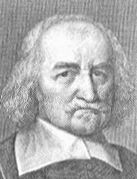Social and Political Philosophy
Study Questions
Thomas
Hobbes, Leviathan
-
Why is the state of nature such a nasty place, according to Hobbes?
What features of people make it so? Why couldn't people form defensive
coalitions to protect themselves?
-
In the state of nature, which actions are morally wrong and which morally
right? Would you do something morally wrong if you broke one of Hobbes'
Laws of Nature?
-
How do people get out of the State of Nature? What kind of government
does Hobbes think people would/should set up? Why not set up a more
limited government?
-
Under what conditions, if any, would it be justified for the citizens of
a Commonwealth to rebel, according to Hobbes?
-
Why, according to Hobbes, can't people lay down their right to defend themselves
against attack? What would Hobbes say about a person who tried to
do so?
-
What is Hobbes' answer to the problem of political obligation? In
other words, why are people morally obliged to obey the laws of their government?
-
The Foole claims that even if it would make sense to contract into a Hobbesian
Commonwealth, it would make even more sense to break the laws of the Commonwealth
whenever you are sure you can get away with it.
-
Why is the Foole's challenge an important one for Hobbes to answer?
What is his reply to the Foole? Who is right, Hobbes or the Foole?
John
Locke, Second Treatise of Government
-
How unpleasant is the State of Nature, according to Locke? (Compare
to Hobbes.) What factors make it less than perfect?
-
What is the status of morality in the State of Nature? What rights
and duties do we have there? In virtue of what do we have these duties
and rights?
-
What type and extent of government is justified, according to Locke?
What are the proper purposes and ends of government?
Jean-Jacques
Rousseau, The Social Contract
-
Why does Rousseau say that political authority must arise from conventions?
Why would Rousseau dislike Hobbes' idea that a commonwealth could justly
arise through "acquisition"?
-
Does Rousseau recommend a limited social contract like Locke's? What
doesn't he like about Hobbes' idea of transferring all of our rights to
an all-powerful Sovereign?
-
What does Rousseau mean by saying that in the ideal state, we "remain as
free as before"? What does he mean when he says that an ideal state's laws
would "force us to be free"?
-
How is the general will different from citizens' particular wills?
Is the general will the same thing as a direct democratic decision on a
policy issue?
Karl
Marx, various readings
-
What commodity has "the peculiar property" Marx speaks of? What is
that property?
-
What is the value of labor-power? What does this mean for how much
workers will be paid?
-
Given the answers to (1) and (2), what is it that capitalists get out of
workers? How do capitalists make profits? What do you think
Marx's complaint is about this system?
-
Note the paragraph at the bottom of p. 145. Does Marx mean what he
says there? Does he really think Freedom and Equality rule in the
marketplace? Why or why not? What does workers' lack of ownership
of any means of production mean for their freedom?
-
How many types of alienation does Marx mention? From what or whom
does he think workers are alienated under the capitalist mode of production?
-
Think about the idea of a loss of control, of a loss of ability to guide
one's own life. How can this idea be used to clarify what Marx says
about alienation from labor's product and alienation from the labor process?
-
Think about the idea of dehumanization, of being treated not as a human
being, but as a machine. Can this idea be used to clarify alienation
from the labor process?
-
Can you think of any reforms in the capitalist mode of production which
might make it less alienating?
-
Must a person feel alienated in order to be alienated? Why does Marx
say that an increase in the pay for workers wouldn't make them un-alienated?
John
Rawls, A Theory of Justice
-
What is the Original Position? Is it a hypothetical or an actual
situation?
-
How is the knowledge of the people in the O.P. restricted by the veil of
ignorance? What do they and don't they know? Why is the veil
there? What purpose does it serve? (This is possibly the single
most important question to be asked about Rawls...)
-
The people in the O.P. are supposed to be making a decision; what is the
decision about? Among what options are they to choose?
-
On what basis are the people in the O.P. to decide? Are they to consider
what the fair, or just, choice would be, or to decide on some other grounds?
-
Rawls thinks the agreement made in the O.P. is as fair as could be; it's
a paradigm of fairness. Why wouldn't an actual bargain be just as
fair? What sorts of factors could undermine the fairness of an actual
agreement, and are they present in the O.P.?
-
What is the moral relevance of equality, according to Rawls? What
is necessary to justify an inequality in the distribution of goods?
(Do you think inequalities are morally relevant, in themselves? Or
only when they arise in certain ways?)
-
Rawls says the phrase "equally open", in his second principle of justice,
can be interpreted in two ways. What's the difference between these
interpretations? Which of them does the social system in the U.S.
come closest to?
-
What are Rawls' main complaints against the system of natural liberty and
against the system of liberal equality? In what way are the complaints
similar? Do you think his objection to liberal equality is convincing?
-
What is the "maximin principle"? If you followed this principle in
your decision-making, would you act conservatively or would you tend to
take risks?
-
Under what conditions does Rawls think it's rational to use the maximin
principle in your decisions? Does the decision situation in the O.P.
fit these conditions?
Robert
Nozick, Anarchy State & Utopia
A few terminological notes:
--"Side constraints": negative rights
--"Holdings": stuff a person possesses, or holds; not necessarily
stuff she has property rights in
--"Entitlements": property rights in holdings
-
Be sure you know the differences among historical, end-state, and patterend
theories of justice. See if you can come up with an example, either
from your reading or from your imagination, of each.
-
What is Nozick's complaint about distributive justice, at the most general
level? The approach of most people who think about distributive justice
is to say, "now that we've got all this stuff, how shall we divide it up"?
What doesn't Nozick like about this question?
-
What is the point of Nozick's "Wilt Chamberlain" example? What is
he trying to establish with it? What could someone who disfavors
large accumulations of property say in response?
-
Nozick claims that taxation is like forced labor. He has two arguments
for this. One is based on the notion of forcing itself. Think
about whether Nozick is right here. If you wanted to force someone
to labor, you'd probably say something like, "labor or suffer punishment".
Does taxation present people with a similar unpleasant choice? What
options does taxation leave open for people?
-
The second argument that taxation is like forced labor claims that taxation
unfairly punishes people for having desires that require money to fulfill.
What do you think of this argument?
-
Nozick claims that people ought not to be allowed to emigrate from a society
governed according to an end-state principle. Why not? Is emigration
like "opting out" of the system of social provision, or are there disanalogies?
-
How does Nozick interpret Locke's Proviso? Does Nozick's proviso
require that initial appropriations leave "enough" for others to appropriate?
-
Nozick thinks that a person may appropriate something as long as her doing
so does not "leave others worse off". He means by this phrase "worse
off than they would have been if the appropriator had never existed."
Can you think of other ways to interpret "worse off"? Might appropriation
leave others worse off under some interpretations, but not under others?
NAVIGATION BAR











